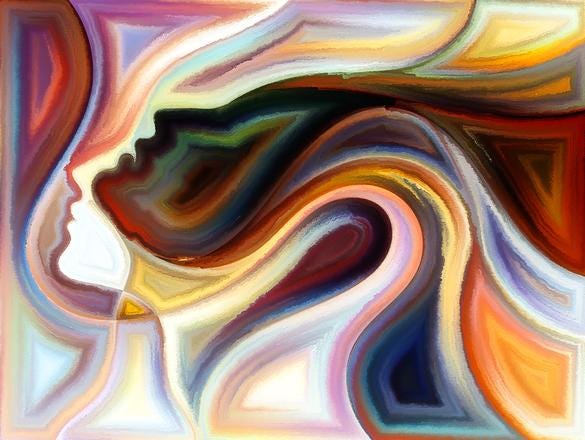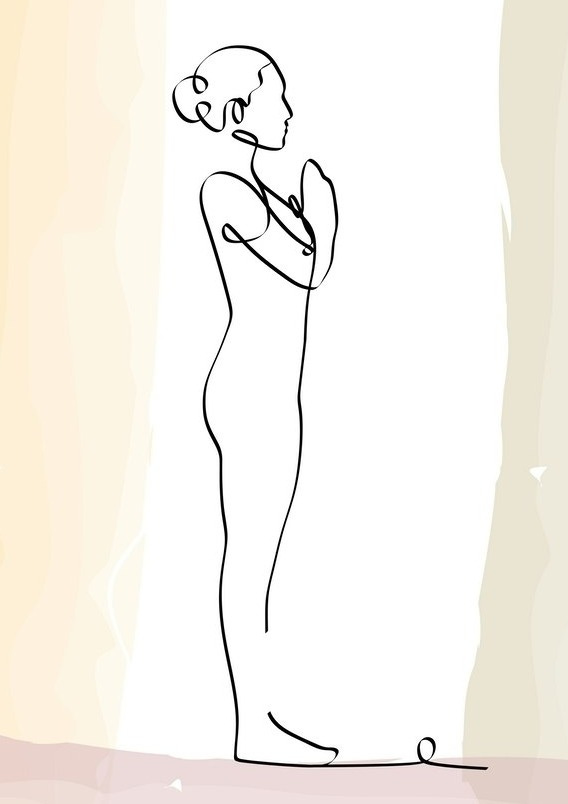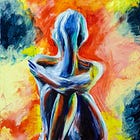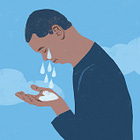“Listen to body as it whispers, before it screams” – Anonymous
Shouldering it All
Being a competitive swimmer in my youth led me to have frequent shoulder dislocations as an adult. My surgeon (who I still see all the time, the joys of working in healthcare – thanks Dr. G) told me “You have extremely loose joints – and that’s what made you a good swimmer – it’s also why the shoulder is dislocating so much now.” He offered this as a simple medical explanation – but it speaks to the human condition. Our strengths are often also our weaknesses.
My doctor wasn’t absolute in recommending surgery, knowing how tough the recovery would be. He said he was “50-50 on it, so it was the dealer's choice.” Not quite as profound of a statement as his previous one - especially for someone who doesn’t gamble.
The dislocations, although painful and unpredictable, weren't so bad and only happened every few months. I became adept at popping my shoulder back in. Sometimes I dislocated at inopportune times – the worst was while I was in the middle of checking my hives and covered in thousands of bees! But still, it didn’t seem that bad or worth going under the knife.
Then I dislocated my shoulder twice in 24 hours. First was while putting on a suit jacket. Then while I was sleeping, I rolled over and was awakened by shooting pain. It was literally a wake-up call. I booked the surgery that day.
I had ignored my body’s whispers and then it was screaming.
It is not lost on me that my body started screaming as my stress level was significant. It was a few months after the initial surge of Covid, when our hospital’s death toll was high. The reason I was putting on a suit was because we were filming a Covid online memorial service that day. I was uncharacteristically rolling around in bed because I was still sleeping in a different room than my husband to quarantine and keep my family safe. And as I’ve written before, during Covid, my usual coping mechanisms were failing me. I felt far from God and it was akin to a dark night of the soul.
My body already had this injury, but stress was exacerbating it. Even if I thought I was dealing with the emotional and spiritual impact of life at that time well - my body held the truth.
A Call To Spiritual Embodiment
Embodiment is a term that is increasingly used in our current vernacular. Psychology defines embodiment as “the lived experience of having a body and how bodily sensations, movements, and actions influence our thoughts, emotions, and identity.” (adapted from Merleau-Ponty's Phenomenology of Perception)
This is a helpful starting place, but what of the spiritual nature? When I worked as a therapist I was tasked with performing Bio-Psychological Assessments on new clients during their intake sessions. When I became a chaplain, I learned to do Bio-Psycho-Spiritual Assessments. Adding in the spiritual component is needed for embodiment as well.
So let’s make sure we are including our spirits in the definition of embodiment. Here are two definitions that are inclusive of that concept.
“Embodiment is the process of being deeply present in the body, using physical awareness as a means of grounding and spiritual awakening.”
- Thich Nhat Hanh, The Miracle of MindfulnessSpiritual embodiment recognizes the body as an integral part of spiritual practice, where physicality and divinity are inseparable.
-Cynthia Bourgeault, The Wisdom Way of Knowing
Some religions embrace embodiment as part of their traditions. Praying through prostrating, dancing or kneeling is employing the body to connect to the divine. Singing chants, smelling incense and eating during worship evokes the senses along with spirituality.
My own Presbyterian denomination does some of these rituals, but above all we are known for our rigidness in body (and maybe beliefs). We are jokingly referred to as the “frozen chosen.” In some circles, I’ve suggested we de-thaw a bit, and it usually isn’t well received.
For many of my chaplain students and spiritual directees, the religions they were reared in had an unhealthy relationship with embodiment. Physical selves were seen only as carnal temptations to be avoided. Women were told that their bodies were stumbling blocks to others. Bodies were sinful and therefore it was better to deny them. It is no wonder that these beliefs become internalized and we feel strange about “recognizing our body as an integral part of spiritual practice.”
When we deny the reality of our physical selves, we are not living fully as spiritual beings.
You’ve likely heard the saying attributed to Pierre Teilhard de Chardin, “We are spiritual beings having a human experience.” The Jesuit priest and philosopher was right. But I wonder if we have to rephrase that famous line for this current issue: “We are spiritual beings because we have a human body experience.”
An Intricate & Delicate Balance
The mind-body-spirit connection is strong. However, discussing this interplay needs to be delicate, as we do not want to emphasize wrongful causation. There is a potential to engender blame, shame and judgment. Sometimes people’s real medical issues are dismissed as only a mind or spiritual condition. I’ve seen the church do this as well as the healthcare system.
For example, before I was officially diagnosed with epilepsy, I was brushed off by some doctors and told that I just needed therapy. After I was correctly diagnosed, I was told by some church folks that if I prayed hard enough, my seizures would stop since they were a trial from God.
I am not one to give people a spiritual reason that their physical suffering is occurring. I actively teach and preach against this sort of toxicity. It is dangerous to respond to others’ suffering in that way. And yet, I cannot deny that I do see a wild correlation between what happens to our spirits and our bodies. There are plenty of times where the two are clearly interconnected.
I’ve written before about what can happen to someone who is separated from nature and suffers from a spiritual “failure to thrive” that becomes a medical diagnosis of the same name. And sometimes the opposite is true, our bodies fail us but our spirit keeps us going. I’ve seen many patients on their deathbeds defer their final breaths until after a holiday or when a family member arrived from a long distance.
There is literally a “broken heart syndrome” that is the heart responding to major stress. While that diagnosis alone is not typically fatal, I have seen many recent widow/ers die just a few weeks or months after their spouses died. Their families suffer a double grief, but they also confide in me that they were not surprised and some even take comfort in knowing the couple is together in the afterlife.
You are likely aware of what newer research tells us about the physical implications of the ways in which emotional trauma resides in the body. Bessel van der Kolk’s seminal book, The Body Keeps the Score, argues just that. Emotional pain can manifest itself in our bodies and lead to all sorts of ailments. Gabor Maté also builds on this idea of trauma impacting the mind-body-spirit connection. He writes "Trauma is not what happens to you. Trauma is what happens inside you as a result of what happened to you." This is worth holding on to, not to discredit what might also be happening medically, but to supplement it and encourage us to listen and connect more deeply to our bodies.
Our bodies hold spiritual wisdom that our minds may not yet understand.
The Body Prayer
See this post for more practical (and hypocritical) guidance on spiritually caring for our bodies. In the meantime, I invite you to try a body prayer. This was developed using the words of 14th century Christian Mystic Julian of Norwich. She was no stranger to pain and suffering in her body and yet she sought to lean into the power of spiritual embodiment. I think it speaks to any of us within or without a specific faith tradition.
It involves engaging in a few body postures and pausing at each one, saying a word aloud. You can do them once or in a couple of cycles. I also think it’s worth paying attention to what word or movement comes naturally to you, where you find yourself wanting to stay or what might be hard today.
Here are the four words and associated movements:
AWAIT [hands at waist, elbows bent and hands open]: Await God’s presence or connection
ALLOW [reach arms up toward the sky]: Allow a sense of connection to come …or not.
ACCEPT [hands clasped over heart]: Accept as a gift whatever you might receive.
ATTEND [hands outstretched, as if serving a platter to others]: Attend to what you are called to do or be at this moment.
And so you can see how well my shoulder is now working a few years after surgery, I’ve included a video of myself doing the movements.
(Note, this is the first time I’ve ever uploaded a video to the internet! Eek! Also, I recorded it last year for my church, so that’s why I’m making fun of Presbyterians. Maybe next time I’ll figure out a better phone camera angle and actually put makeup on, but here I am - embodied!)













I really loved this post. I’ve done worship dance for years and often have to explain the benefits to those who don’t “get it.” Back in the fall I had the opportunity to bring my faith-based dance group to a women’s prison for a workshop. We were able to bring joy into a place where sorrow and trauma is the norm. Lots of healing for those ladies, as well as for us.
This was a powerful practice for me, Christine. I do believe that our stance, or posture, affects how we feel, as as being open in our stature in savasana in yoga, and uncrossing our legs and arms as we sit and listen to someone, so we can be more receptive. I found the body prayer quite profound and I will add this into my routine on a regular basis I think!